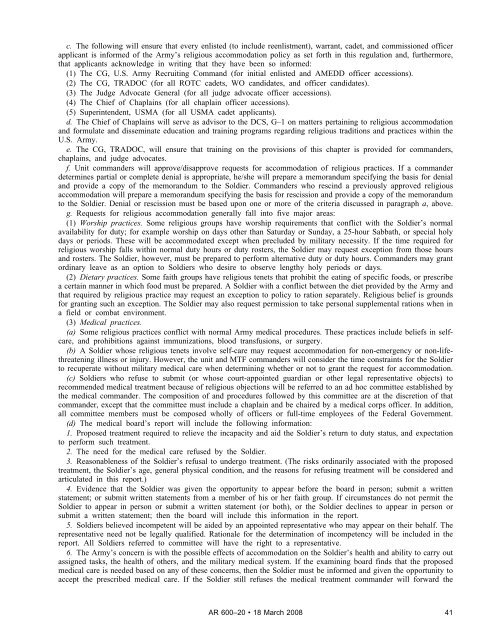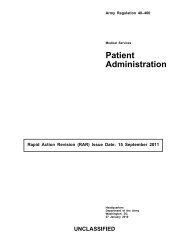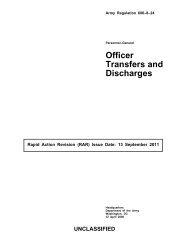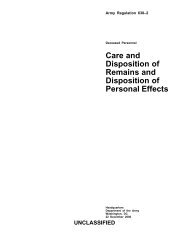AR 600-20, Army Command Policy - Army Publishing Directorate ...
AR 600-20, Army Command Policy - Army Publishing Directorate ...
AR 600-20, Army Command Policy - Army Publishing Directorate ...
Create successful ePaper yourself
Turn your PDF publications into a flip-book with our unique Google optimized e-Paper software.
c. The following will ensure that every enlisted (to include reenlistment), warrant, cadet, and commissioned officer<br />
applicant is informed of the <strong>Army</strong>’s religious accommodation policy as set forth in this regulation and, furthermore,<br />
that applicants acknowledge in writing that they have been so informed:<br />
(1) The CG, U.S. <strong>Army</strong> Recruiting <strong>Command</strong> (for initial enlisted and AMEDD officer accessions).<br />
(2) The CG, TRADOC (for all ROTC cadets, WO candidates, and officer candidates).<br />
(3) The Judge Advocate General (for all judge advocate officer accessions).<br />
(4) The Chief of Chaplains (for all chaplain officer accessions).<br />
(5) Superintendent, USMA (for all USMA cadet applicants).<br />
d. The Chief of Chaplains will serve as advisor to the DCS, G–1 on matters pertaining to religious accommodation<br />
and formulate and disseminate education and training programs regarding religious traditions and practices within the<br />
U.S. <strong>Army</strong>.<br />
e. The CG, TRADOC, will ensure that training on the provisions of this chapter is provided for commanders,<br />
chaplains, and judge advocates.<br />
f. Unit commanders will approve/disapprove requests for accommodation of religious practices. If a commander<br />
determines partial or complete denial is appropriate, he/she will prepare a memorandum specifying the basis for denial<br />
and provide a copy of the memorandum to the Soldier. <strong>Command</strong>ers who rescind a previously approved religious<br />
accommodation will prepare a memorandum specifying the basis for rescission and provide a copy of the memorandum<br />
to the Soldier. Denial or rescission must be based upon one or more of the criteria discussed in paragraph a, above.<br />
g. Requests for religious accommodation generally fall into five major areas:<br />
(1) Worship practices. Some religious groups have worship requirements that conflict with the Soldier’s normal<br />
availability for duty; for example worship on days other than Saturday or Sunday, a 25-hour Sabbath, or special holy<br />
days or periods. These will be accommodated except when precluded by military necessity. If the time required for<br />
religious worship falls within normal duty hours or duty rosters, the Soldier may request exception from those hours<br />
and rosters. The Soldier, however, must be prepared to perform alternative duty or duty hours. <strong>Command</strong>ers may grant<br />
ordinary leave as an option to Soldiers who desire to observe lengthy holy periods or days.<br />
(2) Dietary practices. Some faith groups have religious tenets that prohibit the eating of specific foods, or prescribe<br />
a certain manner in which food must be prepared. A Soldier with a conflict between the diet provided by the <strong>Army</strong> and<br />
that required by religious practice may request an exception to policy to ration separately. Religious belief is grounds<br />
for granting such an exception. The Soldier may also request permission to take personal supplemental rations when in<br />
a field or combat environment.<br />
(3) Medical practices.<br />
(a) Some religious practices conflict with normal <strong>Army</strong> medical procedures. These practices include beliefs in selfcare,<br />
and prohibitions against immunizations, blood transfusions, or surgery.<br />
(b) A Soldier whose religious tenets involve self-care may request accommodation for non-emergency or non-lifethreatening<br />
illness or injury. However, the unit and MTF commanders will consider the time constraints for the Soldier<br />
to recuperate without military medical care when determining whether or not to grant the request for accommodation.<br />
(c) Soldiers who refuse to submit (or whose court-appointed guardian or other legal representative objects) to<br />
recommended medical treatment because of religious objections will be referred to an ad hoc committee established by<br />
the medical commander. The composition of and procedures followed by this committee are at the discretion of that<br />
commander, except that the committee must include a chaplain and be chaired by a medical corps officer. In addition,<br />
all committee members must be composed wholly of officers or full-time employees of the Federal Government.<br />
(d) The medical board’s report will include the following information:<br />
1. Proposed treatment required to relieve the incapacity and aid the Soldier’s return to duty status, and expectation<br />
to perform such treatment.<br />
2. The need for the medical care refused by the Soldier.<br />
3. Reasonableness of the Soldier’s refusal to undergo treatment. (The risks ordinarily associated with the proposed<br />
treatment, the Soldier’s age, general physical condition, and the reasons for refusing treatment will be considered and<br />
articulated in this report.)<br />
4. Evidence that the Soldier was given the opportunity to appear before the board in person; submit a written<br />
statement; or submit written statements from a member of his or her faith group. If circumstances do not permit the<br />
Soldier to appear in person or submit a written statement (or both), or the Soldier declines to appear in person or<br />
submit a written statement; then the board will include this information in the report.<br />
5. Soldiers believed incompetent will be aided by an appointed representative who may appear on their behalf. The<br />
representative need not be legally qualified. Rationale for the determination of incompetency will be included in the<br />
report. All Soldiers referred to committee will have the right to a representative.<br />
6. The <strong>Army</strong>’s concern is with the possible effects of accommodation on the Soldier’s health and ability to carry out<br />
assigned tasks, the health of others, and the military medical system. If the examining board finds that the proposed<br />
medical care is needed based on any of these concerns, then the Soldier must be informed and given the opportunity to<br />
accept the prescribed medical care. If the Soldier still refuses the medical treatment commander will forward the<br />
<strong>AR</strong> <strong>600</strong>–<strong>20</strong> 18 March <strong>20</strong>08<br />
41
















